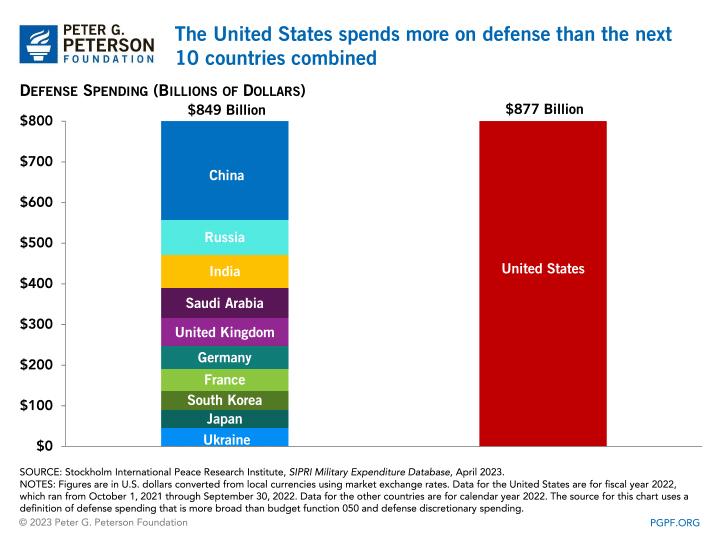
3 minute read
1Feeding the War Machine: The Destructive Influence of the Military-Industrial Complex
The militarization of capitalism starkly illustrates the perversion of economic resources. In 2023, the U.S. military budget is a staggering $877 billion, a figure so immense it defies comprehension. This allocation stands in stark contrast to the resources apportioned to critical domestic programs such as healthcare, education, and social security. The enormity of this military expenditure starkly illuminates the priorities of an unchecked capitalist system. More alarmingly, it reveals a proclivity for conflict over cooperative diplomacy, a stance that is fundamentally at odds with the Quaker commitment to peace.
A reasonable and significant cut in defense spending to be in keeping with other coutries would make a profound differece ihe qulaity of life in America. Globally it is estimated that world’s hunger killing 25,000 cildren a day could be solved with an investment of $30 billion a year
Advertisement
The term "military-industrial complex" was first coined by President Dwight D. Eisenhower in his 1961 farewell address, forewarning the nation of an emerging, intertwined relationship between the military, government, and the defense industry. More than sixty years later, Eisenhower's ominous prophecy rings even louder in our collective consciousness as we grapple with its consequential realities.
1 Back in July of 2021, U.N. World Food Programme Executive Director David Beasley told us it would take an estimated $40 billion each year to end world hunger by 2030. https://www.wfpusa.org/articles/how-much-wouldit-cost-to-end-world-hunger/
In the context of unregulated capitalism, the defense industry wields significant influence over military spending, foreign policy, and, in many ways, the trajectory of our nation. Its lobbying power extends deep into the heart of our political system, infiltrating the halls of Congress, and even shaping the rhetoric and decisions of our elected officials.

Campaign contributions and targeted endorsements serve as the lubricant for this vast machine, perpetuating a cycle of escalating military spending that fuels conflict abroad while overshadowing domestic needs at home.
However, it's important to clarify a misperception often held hostage by defense hawks - an astronomical military budget does not guarantee security or peace. The $877 billion U.S. military budget for 2023, breathtaking in its scale, stands more as a monument to the power of vested interests and lobbyists than a genuine reflection of national defense requirements.
This spending fuels a perpetual war footing that keeps the nation in a constant state of readiness for conflict. It ignites an arms race with other nations and groups, further destabilizing already fragile regions. The physical and human destruction borne from this spending is immeasurable, with civilian casualties, refugee crises, and environmental degradation often serving as grim tolls of warfare.
Moreover, it represents a tragic misallocation of resources. Imagine the potential advancements in education, healthcare, infrastructure, and social welfare if even a portion of these resources were redirected. Investment in diplomacy and international cooperation could potentially address the root causes of conflict, fostering a more peaceful global community. And domestically, these funds could dramatically enhance quality of life, providing a potent stimulus for economic growth and societal advancement.
Therefore, it's critical to reassess and reorient our spending priorities away from the relentless pursuit of military dominance towards peaceful conflict resolution, domestic prosperity, and global stability. This entails a rigorous audit of our defense budget, a strengthening of regulatory checks on the defense industry, and a renewed commitment to diplomacy. This pivot will not be easy, given the entrenched interests at play, but it is a necessary endeavor for a more peaceful, equitable, and sustainable future.
Moreover, these funds could significantly strengthen necessary domestic programs. For example, in 2023, healthcare costs are continuing to rise, leaving many Americans without access to vital medical services. Likewise, public education systems are struggling to provide quality instruction and retain skilled teachers due to budget constraints. Meanwhile, social security funds are dwindling, leaving the elderly, and disabled in precarious financial situations. A reallocation of a portion of military spending could drastically improve these programs, thus benefiting countless American citizens directly.
Moreover, it's worth considering the long-term implications of this massive military spending. It perpetuates a global arms race, strains diplomatic relations, and puts the world on a seemingly endless path of warfare and conflict. Moreover, it undermines peace-building efforts by signaling a lack of faith in diplomacy and cooperation, which are core tenets of Quaker philosophy.
While defense is undoubtedly a critical component of national security, the disproportionate military budget calls for urgent reassessment. From a Quaker perspective, such astronomical spending on warfare and conflict, at the expense of domestic programs and diplomacy, requires critical examination and redress. It is time to chart a new course, one that places a greater emphasis on domestic welfare, global cooperation, and peace. As a society, we must demand better distribution of resources that respects the sanctity of human life and values peace over warfare.


